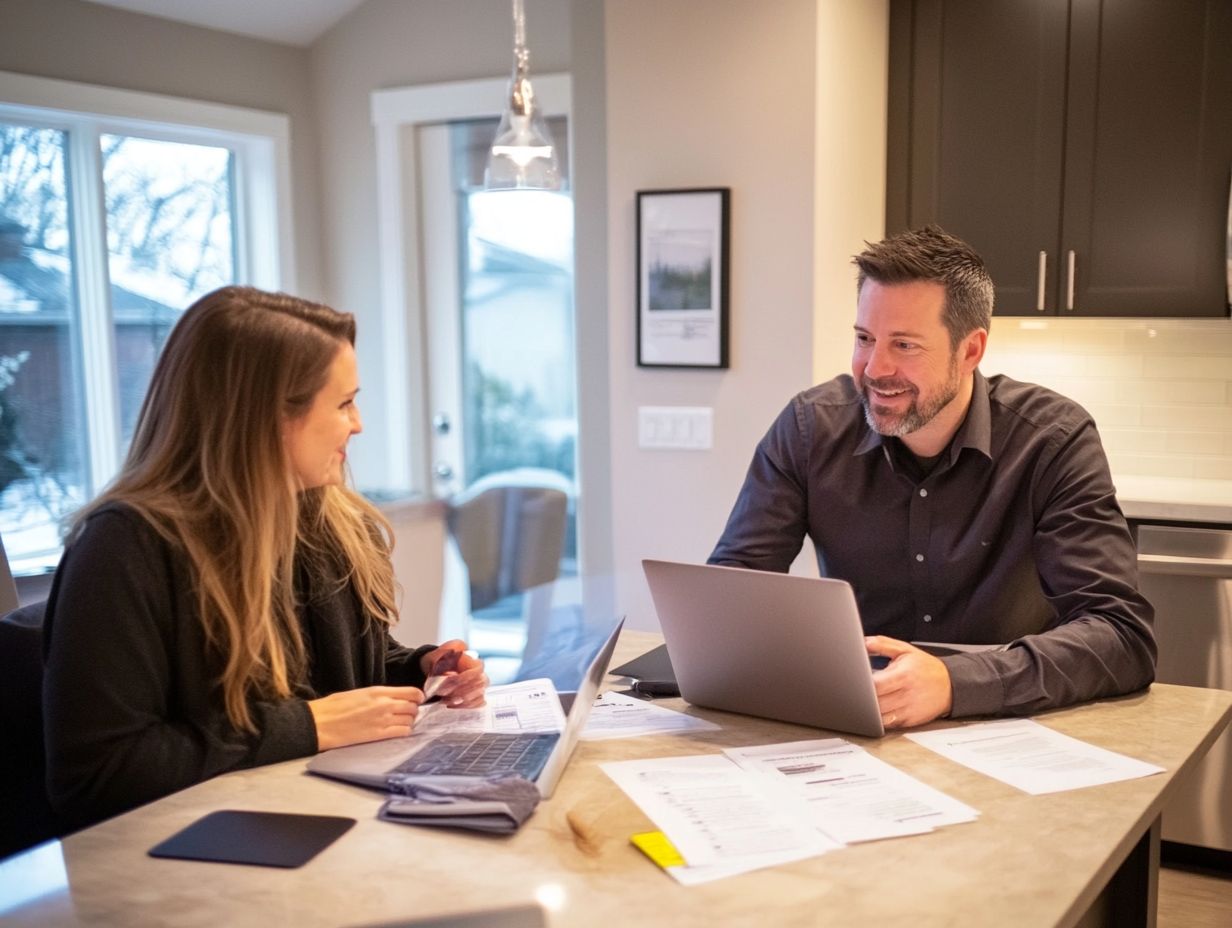The Importance of Agent Communication in Home Sales
Effective communication stands as the cornerstone of successful home sales. It allows you to build strong relationships with clients, fostering trust and understanding crucial elements in the buying process.
This discussion delves into various aspects of communication that play a vital role in real estate transactions, from using active listening techniques to the significance of body language. It also examines how technology can elevate your communication skills, offering practical tips for maintaining a strong rapport with clients.
Whether you re a seasoned agent or just embarking on your journey, mastering these skills can dramatically enhance your ability to close those deals!
Contents
Key Takeaways:

Effective communication is crucial for successful home sales, as it builds trust and understanding with clients. Using active listening and clear communication techniques greatly improves agent-client relationships and helps handle difficult conversations. Additionally, understanding the importance of agent expertise in pricing homes can significantly impact the outcome of a home sale, along with nonverbal communication, such as body language and tone of voice.
The Role of Communication in Home Sales
In the fast-paced realm of real estate, effective communication is essential for successful home sales. It profoundly shapes your relationship with clients and influences every aspect of the selling process, highlighting the importance of a good agent in a hot market.
As a real estate agent, you must employ strategic approaches to provide timely updates, meet client expectations, and maintain ethical obligations while navigating market trends and buyer behavior.
This requires harnessing your negotiation skills and practicing transparent communication to build trust and facilitate successful transactions ultimately paving the way for client referrals and repeat business.
Why Effective Communication is Essential
Effective communication is vital in real estate. It allows you as an agent to explain offers and market trends to your clients clearly, ensuring everyone is on the same page. Understanding the role of agents in real estate negotiations enhances this clarity, builds trust, and significantly enriches the client-agent relationship.
When you carefully pay attention to what clients say and thoughtfully respond to their concerns, you gain insight into their unique needs and preferences. Moreover, effective communication is a cornerstone of your negotiation skills; it gives you the power to confidently advocate for your clients’ interests, articulating the value of each property and securing favorable terms.
Ultimately, this approach creates a more satisfying experience for your clients. Their specific desires are acknowledged and addressed, leading to successful transactions and lasting partnerships.
Building Relationships with Clients

Building strong relationships with clients is essential for you as a real estate agent. This establishes a foundation of trust that encourages engagement and satisfaction throughout the home buying and selling processes.
By prioritizing effective communication and actively listening to your clients’ needs, you can tailor your services to make them feel valued and understood.
This approach leads to successful transactions and lays the groundwork for future referrals.
Creating Trust and Understanding
Creating trust and understanding between you and your clients is fundamental, as it directly influences the overall experience and outcome of property transactions.
To cultivate this essential connection, you can adopt various strategies that emphasize transparency and integrity throughout the process.
By engaging in ethical communication practices, you not only convey vital information but also demonstrate genuine care for your clients’ needs. When you are responsive to their inquiries, it shows you prioritize their concerns, fostering a reassuring atmosphere.
Regularly providing timely updates tailored to align with your clients’ expectations can further strengthen this relationship, ensuring they feel informed and valued at every stage of their journey.
Start today! Effective communication can transform your real estate practice!
Effective Communication Techniques
Implementing effective communication techniques is essential for you and your real estate agent. These methods elevate client engagement and streamline problem-solving in intricate transactions, especially when following tips for selling your home with an agent’s help.
By practicing active listening and maintaining clarity in your communication, you can gain a deeper understanding of your clients’ needs and respond appropriately. This builds a positive relationship with your clients, leading to successful sales.
Active Listening and Clear Communication

Active listening, paired with clear communication, is essential for you as a real estate agent. It ensures your clients feel genuinely heard and understood throughout their home buying and selling journey, highlighting the role of a real estate agent in home buying.
This two-pronged approach helps you understand your clients’ needs and preferences. It also establishes an atmosphere of trust and respect.
When you engage with clients through nodding, paraphrasing, or asking clarifying questions you show authentic interest in their concerns.
These practices reveal hidden desires for amenities or neighborhood features. They also empower you to provide tailored solutions.
By bolstering these listening efforts with concise, transparent dialogue, you can navigate complex transactions with greater ease, fostering enhanced client satisfaction and lasting relationships.
The Importance of Nonverbal Communication
Nonverbal communication holds immense significance in real estate, where body language and tone can convey messages as powerfully as spoken words.
As a real estate agent, it’s crucial to be attuned to your nonverbal cues. These subtle signals influence how clients perceive you and play a vital role in building trust during the home buying and selling journey, especially when it comes to understanding the role of agents in home inspections.
Body Language and Tone of Voice
Understanding body language and tone is crucial for you as a real estate agent. These aspects of nonverbal communication dramatically influence your clients’ trust and comfort levels.
A warm smile and open gestures convey friendliness, helping clients feel more at ease during what is often a stressful process.
Nodding while listening shows you value their concerns, fostering a deeper connection. Conversely, crossing your arms or speaking in a monotone voice may appear disinterested or defensive.
By tuning into these subtle cues, you elevate your professionalism and cultivate an inviting atmosphere. This leads to smoother transactions and more satisfying outcomes for everyone involved.
Handling Difficult Conversations

Navigating difficult conversations is essential for you as a real estate agent. It requires strong negotiation skills to effectively address objections while keeping client satisfaction at the forefront.
When discussing pricing strategies or managing buyer interest, approach these discussions with empathy and professionalism. This fosters trust and leads to positive outcomes.
Dealing with Objections and Negotiations
Effectively handling objections and negotiations is essential for you as a real estate agent. These pivotal moments dictate the success of a transaction and significantly influence client satisfaction.
Mastering the art of addressing concerns requires you to employ strategic communication techniques that promote collaboration. By actively listening to objections, you enhance problem-solving skills and demonstrate genuine empathy.
Asking open-ended questions encourages dialogue and reveals valuable insights crucial for crafting customized solutions. Building rapport throughout the negotiation process eases tensions and fosters productive exchanges, ultimately leading to mutually beneficial outcomes and lasting relationships in the competitive real estate landscape.
Start using these techniques today to elevate your client relationships!
The Impact of Technology on Agent Communication
Technology has transformed communication in real estate. It equips you with innovative tools that elevate client engagement and simplify timely updates.
By harnessing CRM systems and various communication tools, you establish a strong presence. This approach enhances your effectiveness and enriches the experience of buying and selling homes.
Utilizing Digital Tools for Effective Communication
Digital tools are essential for real estate agents. They streamline interactions and elevate client engagement.
With CRM systems, you manage client relationships effectively. This ensures your communications are personalized and relevant.
These platforms allow you to track client preferences and important updates. You can send timely information about new listings or market changes.
Communication tools like Slack or video conferencing enable real-time discussions. This helps maintain strong connections with clients on the go.
Integrating these digital tools enhances your responsiveness. Your clients will feel valued and informed throughout their journey.
Best Practices for Agent Communication
Implementing best practices is crucial for building strong relationships with clients. This enhances engagement and paves the way for successful transactions.
Prioritize swift response times. Use clear communication methods to address client needs and manage expectations.
Tips for Maintaining Strong Communication with Clients
Strong communication requires dedication and smart strategies. Here are key tips to elevate client satisfaction.
Prioritize timely updates to keep clients informed. This could involve regular newsletters or check-in messages highlighting important milestones.
Practice active listening. It s about understanding clients needs and concerns, not just hearing them.
Promptly addressing inquiries builds trust and shows your commitment. Implementing these strategies will strengthen your client relationships.






